Introduction
How To Keep Pigeons Away From Bird Feeder: Bird feeders can bring joy and vibrancy to your outdoor space by attracting a variety of beautiful birds. However, one common challenge many bird enthusiasts face is the presence of pigeons, which can dominate the feeding area and deter smaller, more desirable species. To maintain a welcoming environment for your feathered friends and discourage pigeons loud from taking over your bird feeder, you’ll need to employ a few strategic techniques and solutions.
Birdwatching is a fulfilling and educational pastime that connects us with the beauty of nature. However, it can become frustrating when unwelcome visitors like pigeons dominate your bird feeder, leaving little room for the diverse array of birds you hope to attract. We will explore innovative and humane methods to address this common issue and help you maintain a welcoming environment for all your feathered friends.
We understand the importance of coexisting peacefully with pigeons while ensuring that your bird feeder remains a sanctuary for other species. Whether you’re a seasoned bird enthusiast or just beginning to discover the wonders of birdwatching, our comprehensive strategies will empower you to keep pigeons at bay while fostering a thriving and diverse bird community.
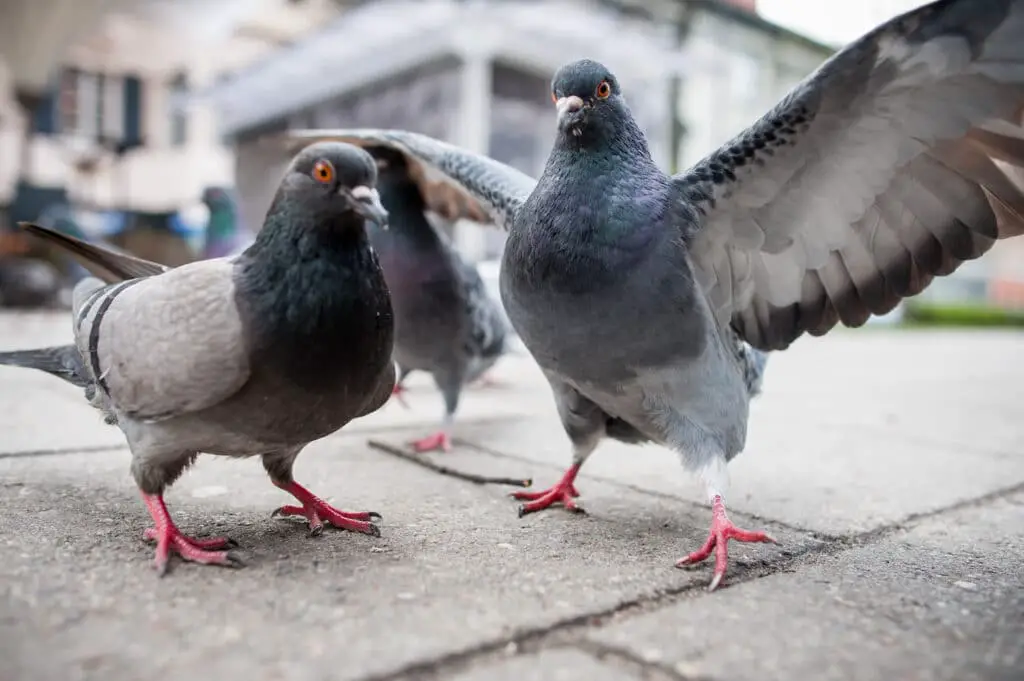
What do pigeons hate the most?
Pigeons dislike strong smells, like cinnamon and hot pepper. To deter pigeons from entering your garden, use cinnamon or peppermint essential oil or cayenne pepper mixed into a spray bottle of water. Spray the mixture anywhere you’ve noticed pigeon activity.
Pigeons dislike landing on surfaces that are uneven or unstable. Installing pigeon spikes or bird netting on flat surfaces like ledges, rooftops, and window sills can be highly effective. These physical barriers make it difficult for pigeons to land comfortably and discourage them from roosting in these areas.
Pigeons are easily startled by reflective and shiny objects. Hanging aluminum foil strips, old CDs, or reflective tape in areas where pigeons gather can create an environment they find uncomfortable. The movement and flashes of light from these objects will deter pigeons from landing and staying.
Ultrasonic bird repellent devices emit high-frequency sound waves that are unpleasant for pigeons but usually inaudible to humans. Placing these devices in problem areas can deter pigeons without causing harm to them or other wildlife.
Pigeons are wary of predators. Using scarecrows, fake owls, or even predatory bird silhouettes can create the illusion of danger for pigeons. Regularly changing the placement of these deterrents prevents pigeons from becoming accustomed to their presence.
How do you keep pigeons away permanently?
To keep pigeons off your balcony, you can use physical barriers such as netting or spikes, install visual deterrents such as fake owls or snake decoys, or use sound deterrents such as ultrasonic bird repellers.
Pigeons have a keen sense of smell, and they dislike strong odors. Applying non-toxic, bird-safe repellents with spicy or pungent scents to surfaces can make those areas unattractive to pigeons. These repellents are available in gel or liquid form.
Pigeons are attracted to areas with an abundance of food scraps and crumbs. Keeping outdoor areas clean and free of food debris will reduce the attractiveness of your property to pigeons. Properly dispose of trash and use bird-proof garbage containers.
Discourage pigeon feeding in your area. Educate neighbors and community members about the issues associated with pigeon overpopulation and the importance of not feeding them. Reducing the availability of food will naturally deter pigeons.
If pigeon infestations persist, consider seeking the assistance of professional pest control services. They have expertise in dealing with bird infestations and can provide humane and effective solutions tailored to your specific situation.
What scares pigeons away?
The easiest way to deter pigeons from your patio, deck, or balcony, is with sound or reflected light. You can achieve this with a wind chime, Mylar balloon, aluminum foil pans or even hanging CD’s. The reflected light disorients the birds. Plastic owl or rubber snake.
Predatory Birds: The presence of predatory birds, such as hawks or falcons, can be highly effective in deterring pigeons. Pigeons recognize these birds as natural threats and will avoid areas where they are spotted. You can use decoy birds of prey or even employ trained raptors in some cases.
Scarecrows: Traditional scarecrows or life-sized human figures placed strategically in problem areas can startle pigeons. Pigeons may perceive them as potential threats and avoid the vicinity.
Owl Decoys: Pigeons are also frightened by owl-like decoys. These fake owls have large, intimidating eyes and can be placed on roofs, windowsills, or other areas pigeons frequent.
Reflective Objects: Pigeons are sensitive to sudden flashes of light and reflective surfaces. Hanging aluminum foil strips, old CDs, or reflective tape in problem areas can deter pigeons due to the unsettling reflections and movements.
How do you keep pigeons away naturally?
Spreading some honey on roof ledges or balconies can help to keep them away. Just keep in mind that the honey may attract other unwanted visitors, such as wasps, ants, and flies. Strong spices. Pigeons do not like strong spices, such as black pepper, chilli, or cinnamon.
Pigeons are attracted to areas with readily available food. The first step in natural pigeon control is to eliminate food sources. Ensure that trash cans are tightly sealed, and avoid leaving food scraps or pet food outdoors. Clean up any spilled birdseed from bird feeders to prevent pigeons from feasting.
Pigeons have a keen sense of smell, and they dislike strong odors. You can use natural scents and spices to deter them. Sprinkle cayenne pepper or chili powder on surfaces where pigeons roost. Alternatively, you can use essential oils like peppermint or citronella on nearby surfaces or in diffusers to create an unpleasant olfactory environment.
Mix white vinegar with water and spray it on surfaces where pigeons gather. The acidic smell of vinegar can deter pigeons. Reapply the solution as needed, especially after rain.
If you have a garden or outdoor space, consider changing the layout to make it less attractive to pigeons. Plant dense shrubs and use trellises or netting to protect your plants and vegetables from pigeon interference.
What is the best killer for pigeons?
Alphachloralose – this poison is usually given to pigeons in the form of treated grains. You should first feed them with grains that are not poisoned for a few days, so as to attract more pigeons to the feeding spot. Alphachloralose makes them feel stupor-like and they later die.
Preventive Measures: The most effective way to manage pigeon populations is through prevention. Ensure that your property does not provide attractive nesting and feeding opportunities for pigeons. Keep food sources secure, seal entry points to potential roosting spots, and maintain a clean environment.
Physical Barriers: Installing physical barriers like bird spikes, netting, or bird wire on surfaces where pigeons roost can deter them without causing harm. These barriers make it uncomfortable for pigeons to land and nest.
Repellents: Non-lethal repellents can be used to discourage pigeons from specific areas. These include motion-activated sprinklers, reflective tape, and odor-based repellents with scents pigeons find unpleasant.
Ultrasonic Devices: Ultrasonic bird repellent devices emit high-frequency sound waves that are annoying to pigeons but typically inaudible to humans. These devices can be effective in deterring pigeons without causing harm.
When pigeons come to your home?
If a pigeon comes home, then your misfortune can turn into good luck. It is said in the scriptures that pigeons are devotees of Goddess Lakshmi. That’s why having a pigeon in the house increases happiness and peace. It is considered better to feed pigeons daily than to keep them.
Prevent Access: Seal off entry points, close gaps, and use physical barriers like bird spikes or netting to deter pigeons from roosting on your property.
Maintain Cleanliness: Regularly clean outdoor areas, including balconies and patios, to remove food scraps and discourage pigeons from foraging.
Use Humane Deterrents: Employ humane deterrents like reflective objects, motion-activated sprinklers, and non-toxic repellents to discourage pigeons from congregating.
Educate Others: Talk to neighbors and community members about the importance of not feeding pigeons. Reducing the availability of food can help deter pigeons from your area.
What is the best scarer for birds?
Scare devices: Use visual deterrents like reflective tape, scare balloons, or plastic predators to frighten birds away. Bird spikes: Install spikes on ledges,
fences, or other perching surfaces to make them uncomfortable for birds.
Mess and Droppings: Pigeon droppings can accumulate rapidly and deface your property. The droppings are not only unsightly but can also damage surfaces over time.
Noise: Pigeons can be noisy, especially during their courtship displays and while cooing. Their vocalizations may disrupt your peace and quiet.
Health Concerns: Pigeon droppings can pose health risks, as they may contain bacteria, parasites, and fungal spores. Inhaling airborne particles from dried droppings can lead to respiratory issues.
Roosting and Nesting: Pigeons often seek sheltered spots to roost and build nests. Common roosting areas include ledges, balconies, roofs, and eaves.
Feeding Habits: Pigeons are opportunistic feeders and will readily consume food scraps, birdseed, and even pet food left outdoors. Their presence can lead to messy feeding areas.
Are pigeons good luck or bad luck?
Yes, when pigeons naturally come and build a nest in your house, it is considered to be auspicious. Vastu experts state that the arrival of birds in the house implies an improvement in life’s fortune. In many cultures, pigeons are considered to be symbolic of fertility and prosperity, fortune, luck, and transformation.
Peace and Harmony: In many cultures, pigeons are seen as symbols of peace and harmony. This association is partly due to their gentle nature and the fact that they are not aggressive birds. Pigeons are often released at weddings and other celebrations as a symbol of love and unity.
Messenger Birds: Pigeons have been used as messenger birds for centuries, dating back to ancient civilizations like the Greeks and Romans. They were highly valued for their ability to carry messages over long distances, which contributed to their positive symbolism as bringers of good news and communication.
Endurance and Resilience: Pigeons are known for their remarkable homing abilities, allowing them to return to their homes from great distances. This trait is admired as a symbol of endurance, adaptability, and resilience, which can be considered attributes of good luck.
Spiritual Significance: In some belief systems, pigeons are associated with spiritual and divine connections. They are seen as messengers of the spirit world or as symbols of divine protection.
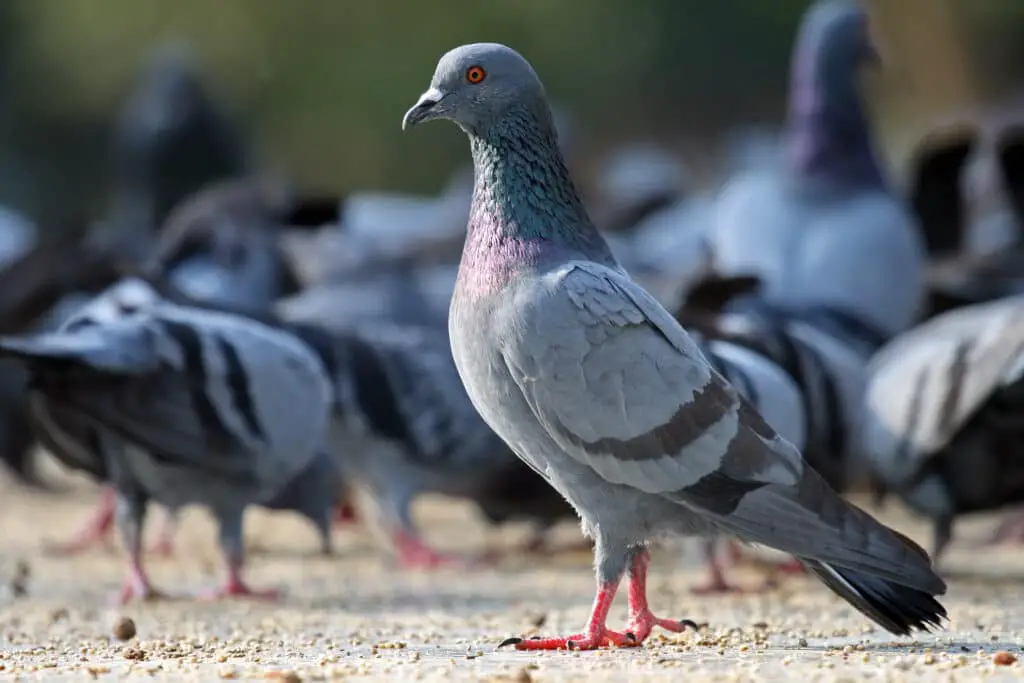
Conclusion
From choosing the right feeder design to clever placement techniques and humane deterrents, we’ve discovered that coexistence with pigeons is indeed possible. Through patience and persistence, we can create a harmonious outdoor space where all birds, whether they are colorful songbirds or the ever-present pigeons, can share in the joy of abundant food and safe refuge.
Remember that birdwatching is not just about observing the vibrant world of avian life but also about appreciating the interconnectedness of all species in our ecosystem. By employing the methods discussed, we can continue to enjoy the beauty and wonder of our feathered friends while maintaining a balanced and diverse bird sanctuary at our bird feeders.
Through these strategies, we can ensure that our bird feeders remain welcoming hubs for a dazzling array of bird species, each contributing to the symphony of nature in their own unique way. By continuing to apply these techniques, we not only keep pigeons away but also nurture a thriving avian community that delights and educates us with every visit.

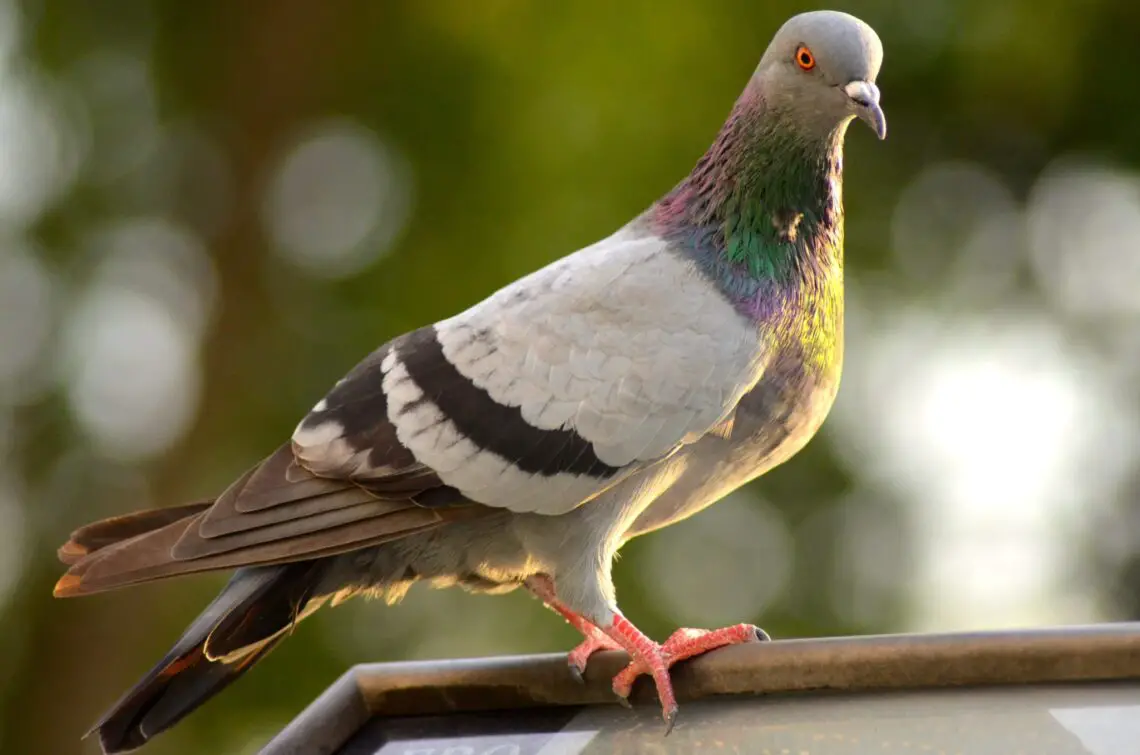
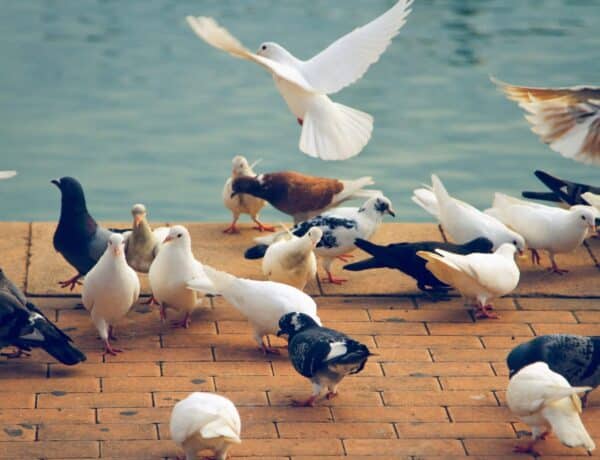
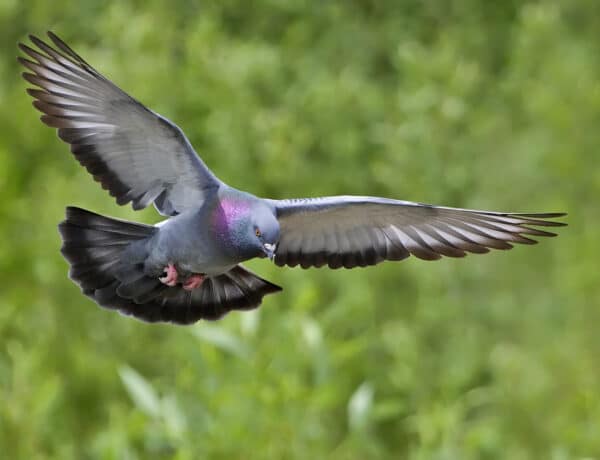
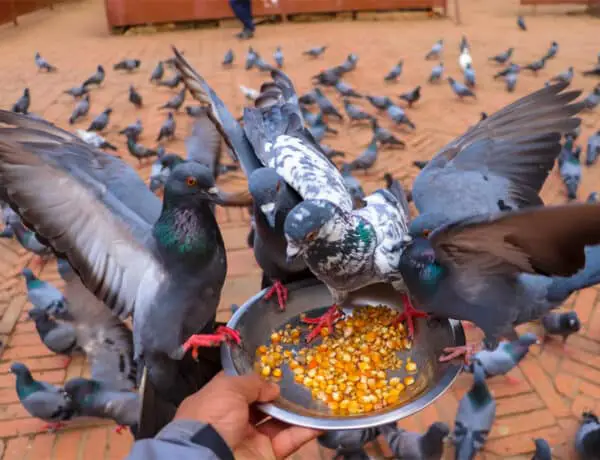
No Comments